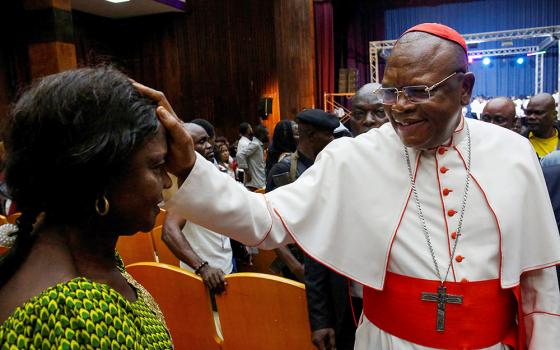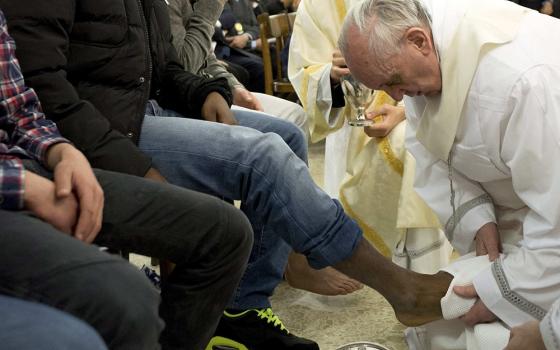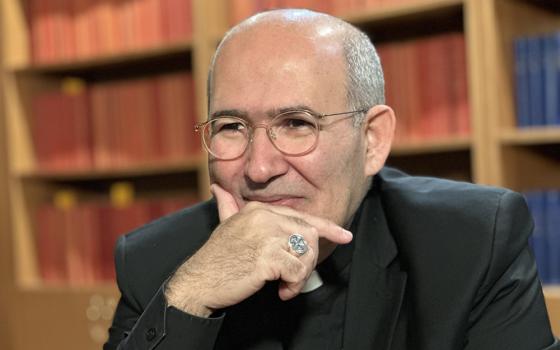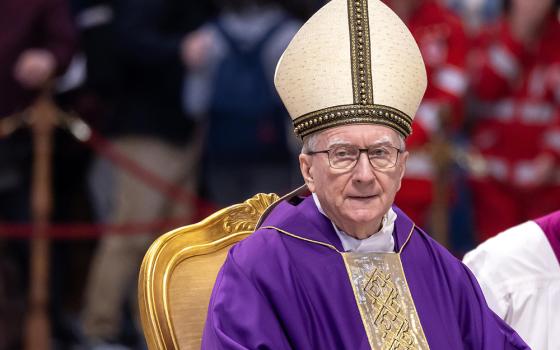Name: Mercy Sr. Carol Rittner
Title: Distinguished Professor of Holocaust & Genocide Studies Emerita and Dr. Marsha Raticoff Grossman Professor of Holocaust Studies Emerita, Stockton University, Pomona, N.J.
Age: 73
Lives in Forty Fort, Pa.
Sr. Camille: Carol, word about the death of Elie Wiesel includes mention of your helping to organize several major conferences with him pursuant to his receiving the Nobel Peace Prize. How did this connection come about?
Sr. Carol Rittner: Like so many people around the world, I first met Elie Wiesel through his writing, specifically his memoir about his time in Auschwitz and Buchenwald, Night. I met him personally in the late 1970s, in Detroit, Michigan. At the time, I was an administrator and teacher at Mercy College of Detroit (now the University of Detroit Mercy) and invited him to come to our campus to give a lecture. Subsequently, in the Fall of 1980, I organized a six-week program around the theme, "After Auschwitz: Vision or Void?" Elie was the first speaker in the program, which included Saul Friedlander, Shlomo Breznitz, and Robert MacAfee Brown.
Shortly after that program, Professor Wiesel invited me to be a member of an advisory committee to what was then the U. S. Holocaust Memorial Council (USHMC) in Washington, D.C., the precursor, so to speak, of the U.S. Holocaust Memorial Museum (USHMM). I would see Elie from time to time, he would ask me about my growing interest in the Holocaust, my teaching and research about the Holocaust, etc.
In 1982, I approached Elie with the idea to organize an international conference focusing on non-Jews who rescued Jews during the Holocaust. We met in Jerusalem, in the lobby of the King David Hotel, and I outlined the idea. He said, "Good. I will help you, and the USHMC will sponsor it." Elie arranged for me to move to Washington, D.C., and have an office in the offices of the U. S. Holocaust Memorial Council.
Where was the conference held?
The conference was held at the U.S. Department of State, with the opening of the conference at the Kennedy Center in September 1984. "Faith in Humankind: Rescuers of Jews During the Holocaust" was an amazing conference, with scholars, survivors, rescuers, and so many others participating. My first book, The Courage to Care: Rescuers of Jews During the Holocaust, and my first film (I worked with Rob Gardner on this), "The Courage to Care", were two wonderful outcomes of that conference. I should say that people still tell me, even these many years later, that they continue to use the book and the film in their teaching.
Elie Wiesel was given the Nobel Peace Prize in October 1986. At just about the same time, I suggested that we should organize another international conference, which we agreed to work on together. That conference, "The Other Victims," focused on non-Jews who were victims of the Nazis -- Sinti and Roma (also known as Gypsies), disabled people, Communists, Soviet POWs, gays, Jehovah's Witnesses, and others. Elie agreed.
In February 1987, the conference on non-Jewish victims of the Nazis was held at the U.S. State Department, with then Secretary of State George Shultz giving the keynote address the first evening. Again, scholars, survivors, Jewish and non-Jewish, and others took part in the conference. Another book, this one edited by the very well-known Holocaust scholar Michael Berenbaum, Mosaic of Victims, and a film, "Triumph of Memory" were two of the outcomes of that conference.
In April or May 1987, at a meeting I had with Professor Wiesel at his home in New York City, he and his wife asked me if I might be interested in becoming the director of a foundation they wanted to start with the Nobel Prize money he had been given along with the honor of receiving the 1986 Nobel Prize for Peace. I was honored to be asked, accepted the challenge, and served as the first director (1987-1990) of The Elie Wiesel Foundation for Humanity.
What inspired your interest in the Holocaust?
In 1967, for my first teaching assignment as a Sister of Mercy, I was sent to teach English in a Catholic high school in Dunmore, Pennsylvania. During that time I read Viktor Frankl's book, Man's Search for Meaning. It is a book about physical, psychological and spiritual survival. Like so many Jews in Nazi-occupied Europe, Viktor Frankl suffered at the hands of the Nazis in their concentration and death camps.
I did not know that Hitler and the Nazis were determined to hunt down, capture, kill every Jew he and they could get their hands on. I learned this as I studied, read, researched.
I was stunned to learn about what Frankl was forced to endure -- Auschwitz -- and what he and so many other Jews suffered, simply because of who they were -- Jews -- not because of anything they had done. I was young, I had just completed my undergraduate degree, I was filled with the hopefulness of Vatican II, and I was so naïve.
The more I read Frankl's book, the more I kept asking myself, "Why didn't Christians in Europe try to help their Jewish neighbors? What happened to 'Love one another?' What happened to all the great Christian teachings about the Good Samaritan?"
It was only later that I came to understand that over nearly two millennia too much of our "great Christian teachings" had denigrated Jews and Judaism. The way the Gospels were read and interpreted, the Holy Week Services that demeaned Jews and Judaism, the stereotypes we Christians had about Jews and Judaism: stiff-necked, clannish, stubborn, refusing to accept Jesus as the Messiah, and so-on. No wonder too many Christians stood by as Jews were being hunted down.
No wonder so-many baptized Christians even participated in killing Jews during World War II and the Holocaust. Nearly two thousand years of "the teaching of contempt" about Jews and Judaism had an adverse, collective effect on Christians. We were numbed, disabled, "encouraged" to be insensitive to living Jews and Judaism. In fact, too many Christians did not even know that Jesus was born a Jew, lived his life as a faithful Jew, died and rose as a Jew.
All of these questions and insights are what have inspired my interest in the Holocaust.
What are you doing to promote it?
I am a teacher -- well, "officially" retired as of July 1, 2015, although I just finished teaching a six-week graduate seminar about the Holocaust at The College of St. Elizabeth in Morristown, New Jersey -- so what I do is what I have done for the past 45 plus years: I teach. I also write and edit books (about 20 at last count), give lectures, organize seminars -- I am organizing one with a colleague from Northern Arizona University at Campion Hall, Oxford University, in October -- respond to requests to present workshops, and continue to try to educate students, along with older adults. I do so in the hope that my efforts will contribute to the efforts of others who also are trying to get people to think about how we relate to Jews and Judaism, to those who are not "us" so that when we are faced with having to help, we do not avert our eyes or turn our backs but reach out and help.
Are your relatives involved in, or supportive of your effort?
I am the only teacher in my birth family, but I think I can say that they are supportive of my efforts, as are the Religious Sisters of Mercy of the Americas, my "religious family."
Are other Sisters of Mercy similarly engaged?
That is a great question! I know that there were Sisters of Mercy who were involved in this work. I am thinking of Sr. Dolores Greeley from St. Louis, Missouri. She taught for a number of years at St. Louis University. She was a very productive scholar in the area of Jewish-Christian relations. Also, I know that Sr. Siena Finley from Dallas, Pennsylvania, who taught for years at College Misericordia had an interest in Jewish-Christian dialogue, and I think she also taught a course on the Holocaust. And, of course, there is Sr. Peta Goldburg, an Australian Sister of Mercy who teaches at Australian Catholic University, and also is very involved in teaching about Catholic-Jewish relations. But I'm probably the most immersed in researching, teaching, writing, and lecturing about the Holocaust, as well as about other genocides.
Where and with whom did you grow up?
I grew up in Central Pennsylvania, in Camp Hill, which is just across the Susquehanna River from Harrisburg. I graduated from Bishop McDevitt Catholic High School, then went on to Immaculata College near Philadelphia. I entered the Sisters of Mercy in Dallas, Pennsylvania, on Sept. 8, 1962.
I grew up with family and friends in Central Pennsylvania.
From whom did you draw inspiration?
I drew my inspiration from Dr. Tom Dooley and from President John F. Kennedy. And I was very inspired by Pope John XXIII and Vatican II.
What led you to the Sisters of Mercy?
I had Sisters of Mercy, among other groups of religious, as teachers in high school. A sister who was a very young nun at the time, Sr. Gilmary (Suzanne) Hudson, was very lively, related well to so many of us, and certainly had a strong influence on me.
What ministries have you had?
Basically I have been involved in education, first as a high school teacher of English for about four years, then as a college administrator and adjunct faculty member at Mercy College of Detroit for a few years. In the 1980s I began working more closely with Professor Elie Wiesel. I was the first Director of The Elie Wiesel Foundation for Humanity, organizing several international conferences, including one in Paris that Elie and then-President Francois Mitterrand convened of Nobel Laureates, "Facing the 21st Century: Threats and Promises."
After I left the Wiesel Foundation, I began working in Derry (aka Londonderry), Northern Ireland, flying back and forth every few weeks to help The Inner City Trust to organize an international conference in Derry City, "Beyond Hate: Living With Our Deepest Differences." Some people say that conference was a catalyst for the 1998 peace process that helped to bring an end to "the troubles" in Northern Ireland.
In 1994, I was invited to be the Ida E. King Distinguished Visiting Scholar in Holocaust Studies at The Richard Stockton College of New Jersey (now Stockton University). I thought I would be there for a year, but I was invited to stay on as Distinguished Professor in Holocaust and Genocide Studies, eventually also being named as the Dr. Marsha Raticoff Grossman Professor in Holocaust Studies.
Are there extensions to your concerns about the Holocaust?
For the last several years I have focused on the use of rape as a weapon of war and genocide. I've organized several scholars seminars, and edited two books (with John K. Roth) about rape as a weapon of war and genocide -- I think it is obvious: Former Yugoslavia, Rwanda, Congo, Central African Republic, Iraq, Syria, and too many other places around the world where men -- not just men, of course, but, unfortunately, mostly men -- perpetrate war and genocide, or genocidal acts against civilians. Women and girls -- in some cases, men and boys too, but, let's face it, it's mostly women and girls -- are victimized, are targeted for the most heinous sexualized violence. They are raped, deliberately impregnated, and forced to bear the child of the male perpetrator's ethnicity. In other cases, women are kidnapped and forced into sexual slavery. And in still other cases, women and girls are sexually mutilated, then left to die.
Call it what you will -- genocide is evil. We must raise our voices against these crimes, this vile behavior.
I try to do this as a teacher, as an educator -- always with the Holocaust in mind. As Elie Wiesel often said, "The opposite of love is not hate, it's indifference." I, for one, do not intend to be indifferent to what is happening to women and girls in too many places around the world.
What spiritual resources do you apply to it?
The Christian Scriptures, particularly the Gospel of Luke.
Do you find understanding and acceptance for your efforts?
Well, it depends. If you mean other Sisters of Mercy: absolutely yes. If you mean misogynists, Holocaust and genocide deniers, racists, bullies, and people like that, then no, there is little or no "understanding and acceptance." But, by and large, I would say that people appreciate the work I do and the efforts I make to draw attention to the issues that are, or should be, a matter of concern to people of good will.
How do you pray?
With difficulty, but every day, usually early in the morning, I try to pray, read, and reflect. I tend to be a rather concrete, so talk about mysticism and cosmic spirituality does not speak to me at all.
What do you think God asks of you?
I think God asks me to love God with my whole mind, heart, and soul, and my neighbor as myself. It's the message and challenge, ever old and ever new. If I could actually exemplify it in my life by being kind, generous, and compassionate always and everywhere to everyone I meet, I think I would always be aware of God's presence -- and in a small way, I think I would be helping to "heal and repair" our fractured world.
Is there anything else you'd like us to know?
I think American religious women, even given our faults and failings, have built and sustained the American church. We have lived generously and in a spirit of Christ-like service to the church and to the wider American society. I continue to be annoyed that the men in the Vatican seem to want to harass and harangue us by sending letters inviting our elected folks to once again report in. I personally think our elected folks should respond by saying, "We are not reporting in to you fellows once again. Our lives, and the lives of thousands upon thousands of women over nearly two centuries have served and saved men, women and children in our schools, hospitals, social service agencies, and parishes. If our lives and their lives do not speak clearly enough to you, our getting on a plane, flying to Rome, and making our way to your offices in the Vatican will not make any difference. Sorry, but we decline your invitation."
Edited for length and clarity.
[Mercy Sr. Camille D'Arienzo, broadcaster and author, narrates Stories of Forgiveness, a book about people whose experiences have caused them to consider the possibilities of extending or accepting forgiveness. The audiobook, renamed Forgiveness: Stories of Redemption, is available from Now You Know Media.]
Editor's note: We can send you an email alert every time Sr. Camille's column, Conversations with Sr. Camille, is posted. Go to this page and follow directions: Email alert signup.






